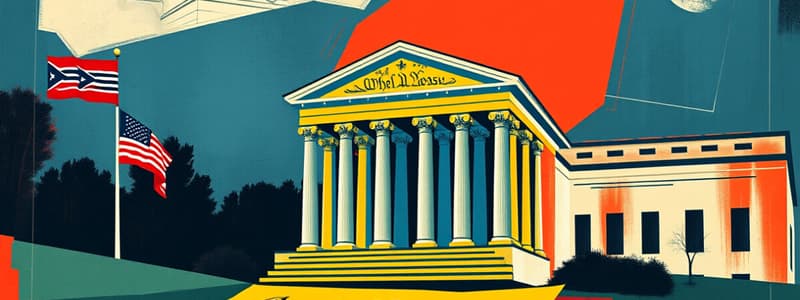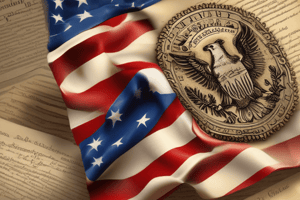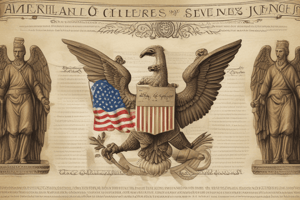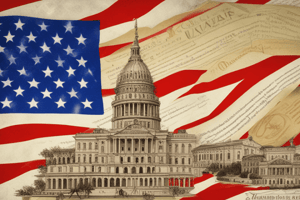Podcast
Questions and Answers
The Constitution gives Congress the power to create federal courts:
The Constitution gives Congress the power to create federal courts:
- Equal to the Supreme Court
- Lower than the Supreme Court (correct)
- Unaffected by the Supreme Court
- Higher than the Supreme Court
During criminal cases, which are guaranteed by the Constitution?
During criminal cases, which are guaranteed by the Constitution?
- Judges and lawyers
- Trials and juries (correct)
- Justices and lawyers
- Judges and trials
In terms of jurisdiction, the Supreme Court has:
In terms of jurisdiction, the Supreme Court has:
- Original and appellate (correct)
- Original and executive
- Legislative and original
- Executive and appellate
Which would most likely fall under the original jurisdiction of the Supreme Court?
Which would most likely fall under the original jurisdiction of the Supreme Court?
Which case would the Supreme Court hear through its original jurisdiction power?
Which case would the Supreme Court hear through its original jurisdiction power?
The selection of federal judges by the executive branch is an example of:
The selection of federal judges by the executive branch is an example of:
The judicial branch has the power to try criminal cases by:
The judicial branch has the power to try criminal cases by:
The Supreme Court is best characterized as:
The Supreme Court is best characterized as:
In which jurisdiction would further review of a federal court decision fall under?
In which jurisdiction would further review of a federal court decision fall under?
Which is a true statement about federal judges?
Which is a true statement about federal judges?
What was the purpose of the Judiciary Act of 1789?
What was the purpose of the Judiciary Act of 1789?
Before McCulloch v. Maryland went to court, the state of Maryland:
Before McCulloch v. Maryland went to court, the state of Maryland:
Which is an example of federal supremacy?
Which is an example of federal supremacy?
Which is the best definition of 'supremacy'?
Which is the best definition of 'supremacy'?
How might the decision in McCulloch v. Maryland make future Supreme Court decisions more complicated?
How might the decision in McCulloch v. Maryland make future Supreme Court decisions more complicated?
What was a result of Gibbons v. Ogden?
What was a result of Gibbons v. Ogden?
An implied power is one that:
An implied power is one that:
Flashcards are hidden until you start studying
Study Notes
Congress and Federal Courts
- The Constitution empowers Congress to establish federal courts below the Supreme Court.
- Federal judges are appointed by the President and confirmed by the Senate, reflecting checks and balances.
Criminal Cases and Jurisdiction
- Constitutional guarantees in criminal cases include the right to trials and juries.
- The Supreme Court has both original and appellate jurisdiction, meaning it can hear cases first or review decisions made by lower courts.
Supreme Court Original Jurisdiction
- Original jurisdiction for the Supreme Court typically involves disputes between states.
- A notable example includes cases where one state sues another over issues like interstate trade.
Judicial Power and Federal Judges
- Federal judges serve lifetime terms, ensuring judicial independence and stability.
- The Judiciary Act of 1789 initiated the federal court system.
Federal Supremacy
- Federal law takes precedence over state laws, exemplified by the inability of states to tax federal entities.
- The highest authority in the judicial system is the Supreme Court, which can assess constitutional validity.
McCulloch v. Maryland Significance
- The ruling established federal supremacy and broadened interpretation of powers, leading to the principle of implied powers.
- Future Supreme Court decisions may become more complex as implied powers require more extensive constitutional interpretation.
Gibbons v. Ogden Outcomes
- The ruling in Gibbons v. Ogden granted Thomas Gibbons the right to operate his steamboats in New York, reinforcing federal control over interstate commerce.
Understanding Implied Powers
- Implied powers are not explicitly defined in the Constitution but are inferred, allowing for a flexible interpretation and application of federal powers.
Studying That Suits You
Use AI to generate personalized quizzes and flashcards to suit your learning preferences.




